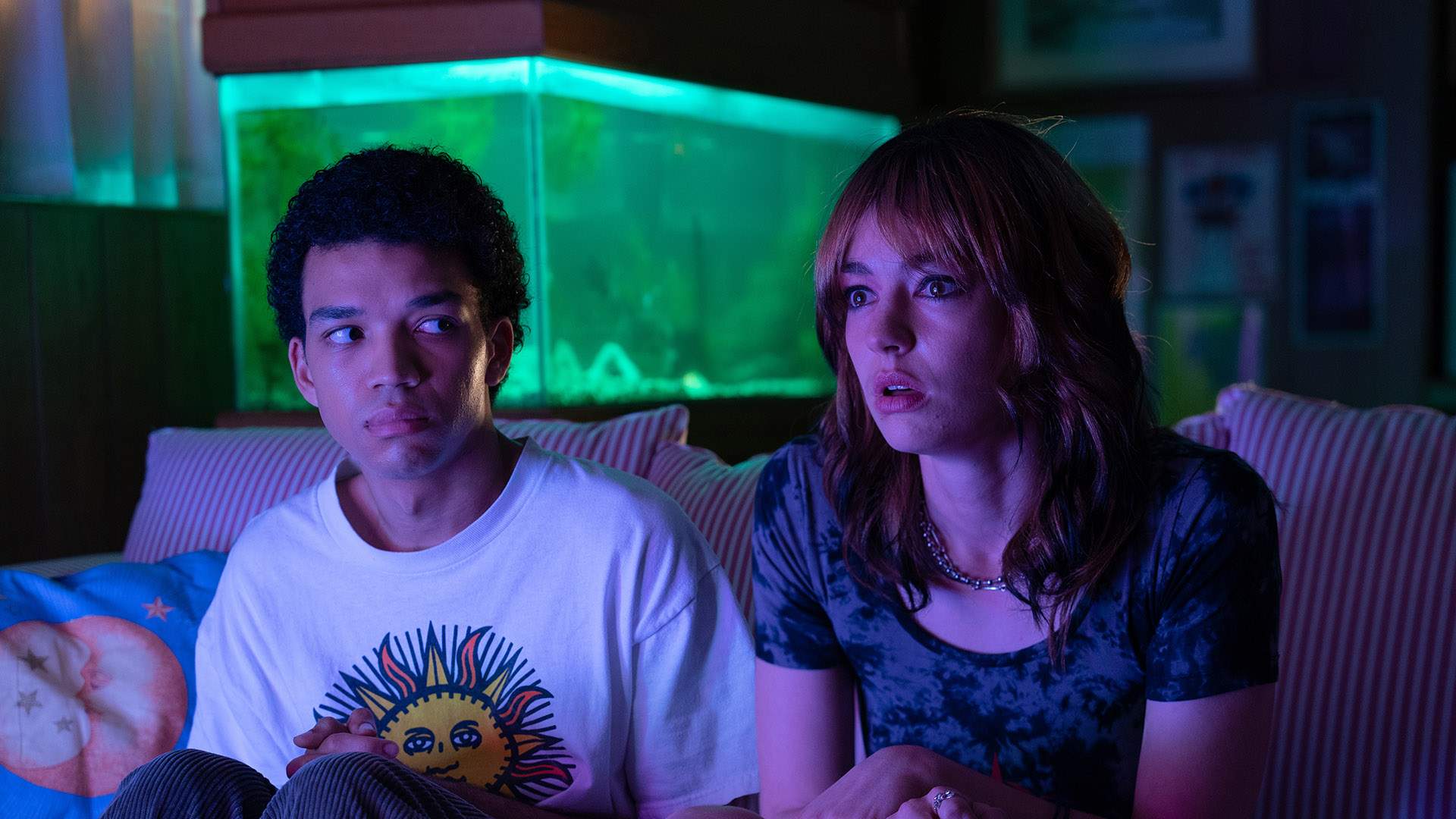Feeling Seen Through 'Buffy', Then Making a New Obsession: Jane Schoenbrun and Brigette Lundy-Paine Talk 'I Saw the TV Glow'
After 'We're All Going to the World's Fair', Jane Schoenbrun hops from online fixations to TV fandom to explore the ways we mediate our identities through screens — with Brigette Lundy-Paine for help.
Whether you tuned in the 90s and early 00s as it aired — staying up late in Australia to catch it on free-to-air TV on a weeknight, or taping it to view afterwards — or binged it via DVDs or streaming later, Buffy the Vampire Slayer has never been a television series that audiences watch casually. Jane Schoenbrun and Brigette Lundy-Paine, writer/director of A24 hit I Saw the TV Glow and one of its stars, have both OG fandom and more-recent obsessions covered. Schoenbrun calls the show their "first love", they explain to Concrete Playground. Lundy-Paine only started viewing it for I Saw the TV Glow but misses it now when they're not watching it, they also tell us.
Schoenbrun, Lundy-Paine and audiences everywhere have Buffy to thank for a movie that's cast its own glow since its Sundance Film Festival premiere — and across stops at the Berlin International Film Festival, SXSW in Austin, Sydney Film Festival and Melbourne International Film Festival since, too, before reaching Australian theatres in general release. Earning its praise as an instant trans cinema cult classic, the pair's collaboration doesn't just take inspiration from Schoenbrun's affection for a pop-culture phenomenon about a high schooler that the undead feared. One of the standout films of 2024, and from A24's adored roster of flicks overall, it's the source of all-consuming passions itself, while also contemplating that very topic.
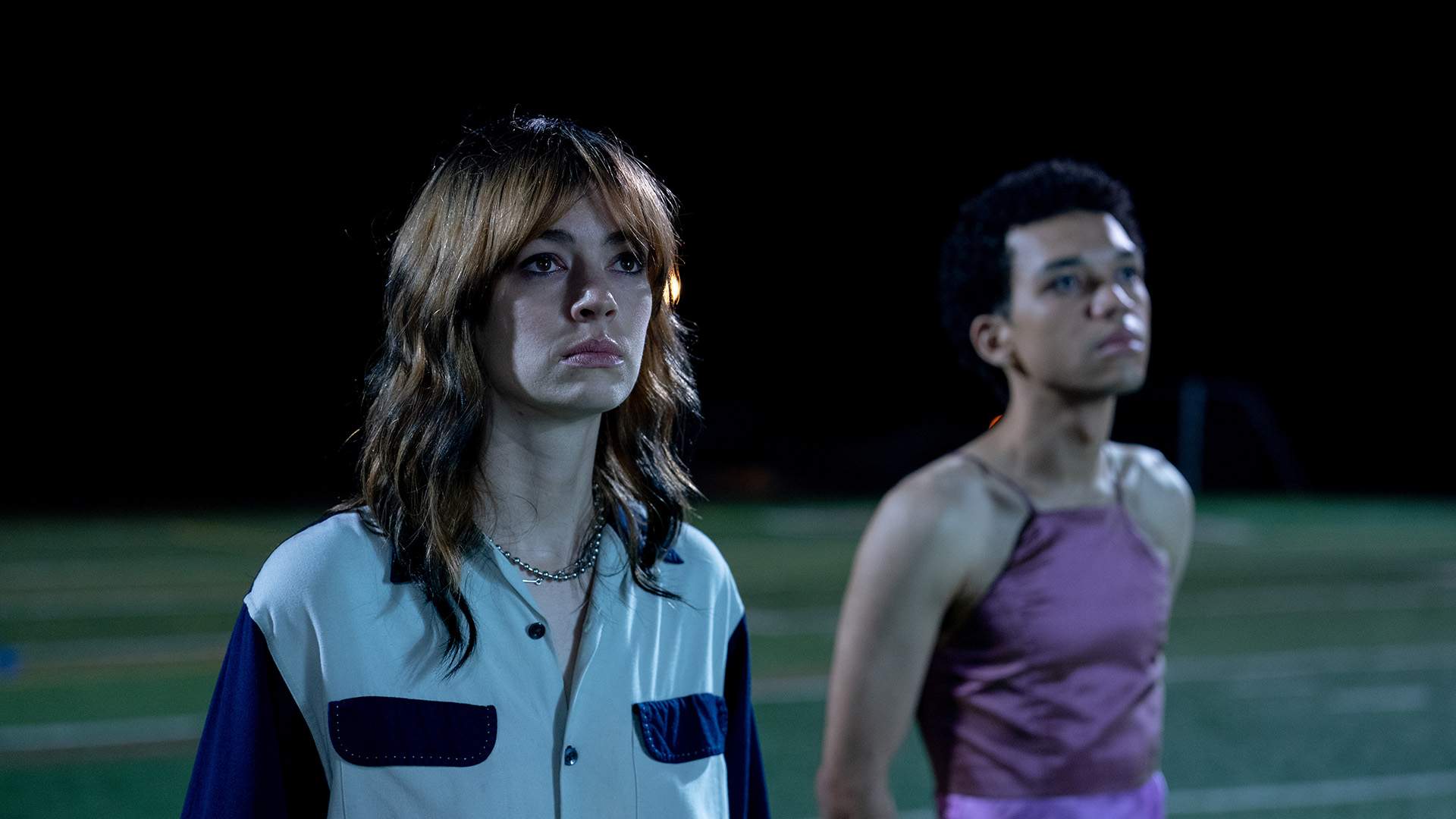
With their 2021 debut feature We're All Going to the World's Fair, Schoenbrun has already pondered how screen fixations can help mediate identities. Two movies in, they have a niche — and a pivotal one. Their films examine the space where fandom and pop-culture obsessions overlap with alienation, dissociation and dysphoria. They explore how they filtering who you are through an internet or TV fixation can assist in processing those emotions and states, and aid in unlocking something that you mightn't have had the tools to recognise otherwise.
Two features in, Schoenbrun has earned their own adjective as well: their films are positively Schoenbrunian. It isn't just the common themes that mark We're All Going to the World's Fair and I Saw the TV Glow as works from the same inimitable voice, but also a shared dreamlike aesthetic, plus a knack for poetic and revealing dialogue. Watching their movies feels like plunging in, being enveloped and experiencing everything that their characters do; it's no wonder that the filmmaker's fare, especially their sophomore picture, is so easy to obsess over.
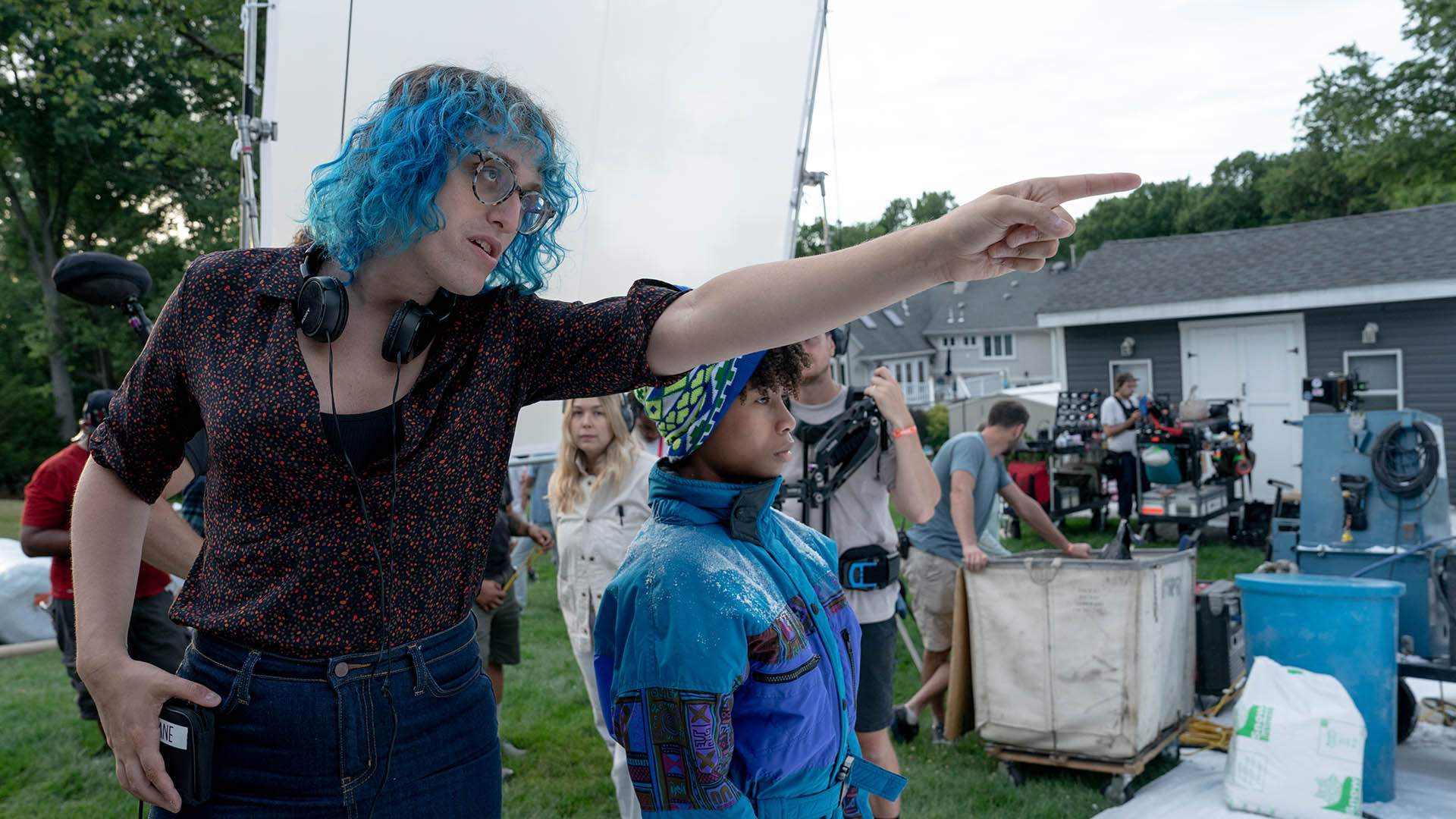
Where We're All Going to the World's Fair follows a teenage girl making connections through an online horror challenge, with the feature digging into dysphoria along the way, I Saw the TV Glow does indeed have a television show at the centre of its plot. In the 90s, teens Owen (Dungeons & Dragons: Honour Among Thieves' Justice Smith, plus Let the Right One In's Ian Foreman as the younger version) and Maddy (Lundy-Paine, Atypical) strike up a friendship over the Buffy-meets-Goosebumps style supernatural series The Pink Opaque. The show is their escape from their adolescent reality, and a coping mechanism — one that Owen, especially, didn't know that he needed. It's also where these new friends feel like they finally see their real selves.
Then Maddy disappears suddenly, The Pink Opaque is cancelled just as abruptly, and the 00s come calling. I Saw the TV Glow jumps further forward, too, as it uncovers the different ways that Maddy and Owen embrace — or don't — their authentic identities. The parallels with the egg-crack moment, the term used when someone realises that they're trans, are as bright and clear as the light emitted from every screen that bathes the movie's main duo in The Pink Opaque. Schoenbrun is always about showing rather than telling, though, and about viewers stepping into Maddy and Owen's emotional state with them rather than simply being informed about it.
Again basking in 90s nostalgia on the big screen after 2020's Bill & Ted Face the Music — where they played Billie Logan, daughter to Keanu Reeves' (John Wick: Chapter 4) Ted — Lundy-Paine was drawn to the raw feeling evident in Schoenbrun's script, as well as their shared perspectives and experiences. We spoke with both Lundy-Paine and Schoenbrun about TV devotions, inspirations, Schoenbrun thematic and stylistic go-tos, telling personal tales, 90s nostalgia and more.

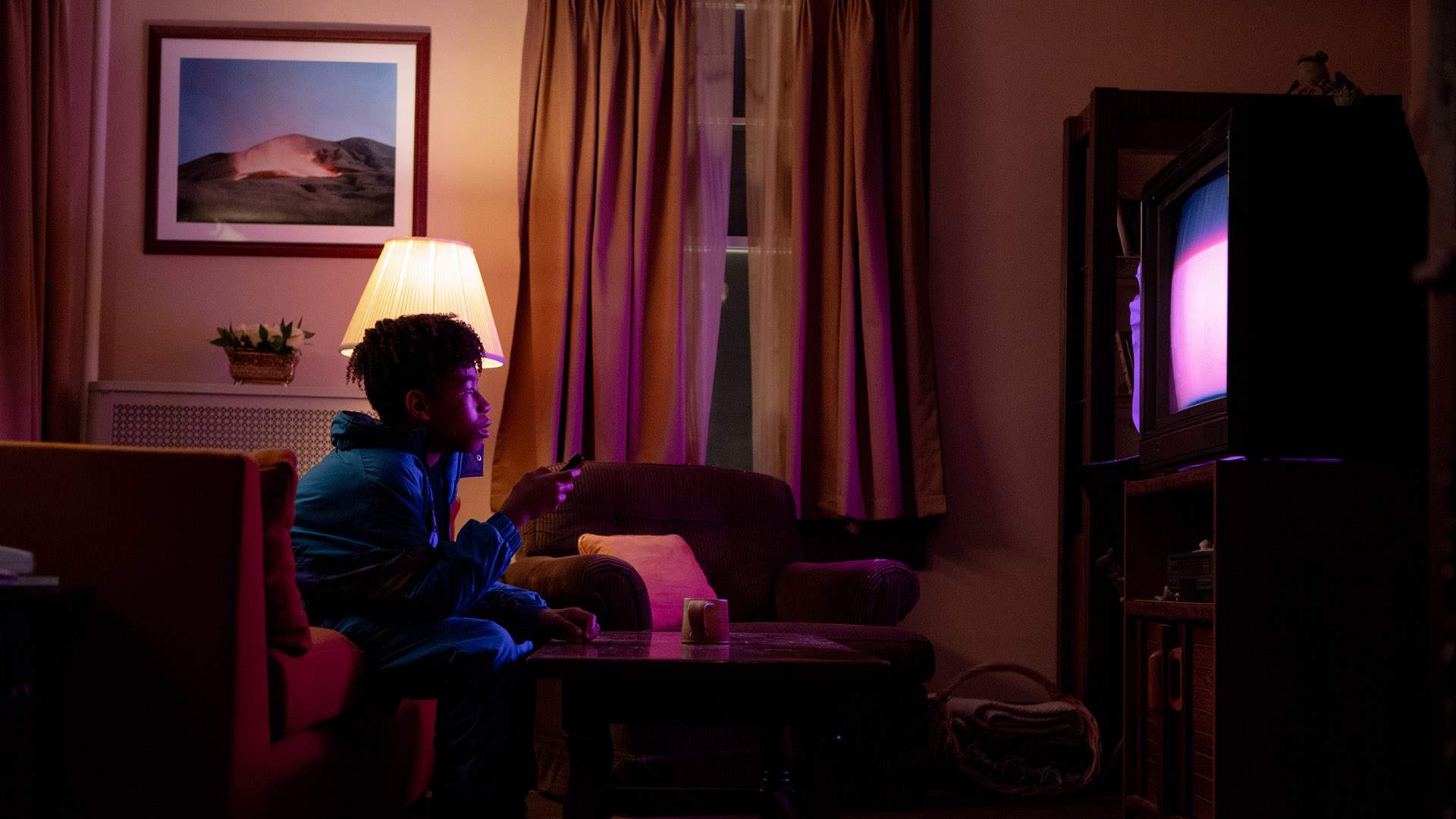
On Falling in Love with Buffy the Vampire Slayer — Then and Now
Jane: "I was just obsessed. I had other TV obsessions, but Buffy was the biggest one that I'll ever have. When I think back a bit on it, and I mean this quite literally, I think of Buffy as my first love.
The amount that I put into that show emotionally, the amount of headspace it took up, each week waiting for the next episode to air, reading about it online — it was just a total obsession. And in many ways, I think — and the film is exploring this as well — it was a coping mechanism, a way for me to express myself in fiction, in a place that felt safe and outside of the quote-unquote real world.
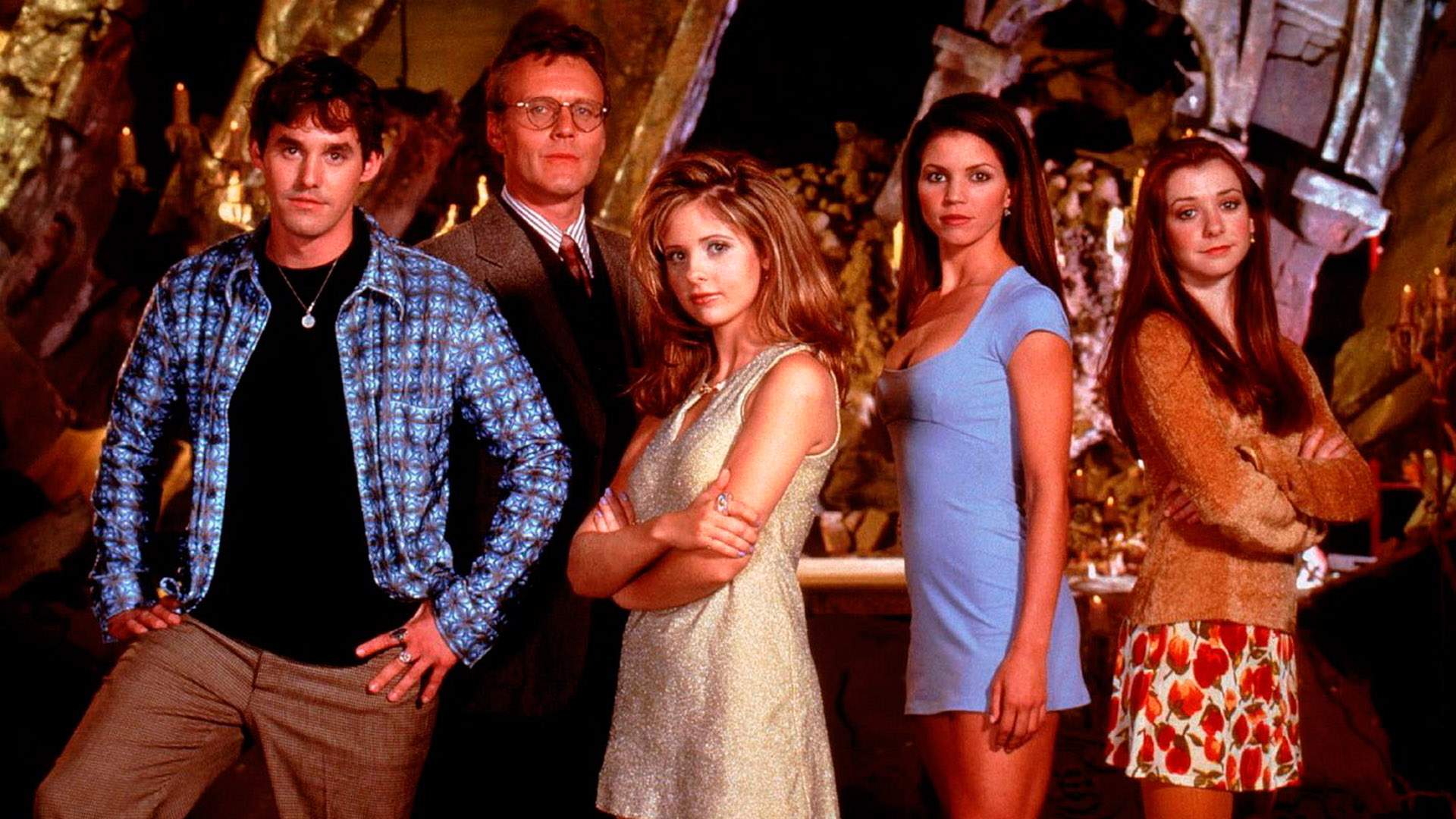
How did I fall in love with Buffy? I was flipping channels on the TV in my parents' bedroom, where I would be relegated when they were watching something on the main TV. And I remember coming across a rerun of the episode from the first season called 'The Pack'. It was the summer after the first season aired, and I was like 'I'm watching this show again next week' — and it just developed from there.
I'd say by the second season, it was my favourite TV show. And by the third season, I was spending a lot of time with Buffy. I had tapes. I made my own tapes. I had the episode guides. I posted online about it. It really became almost this like space for me to hide and I just loved it so much.
I remember when it was ending, thinking 'oh my god, this is like losing family'."
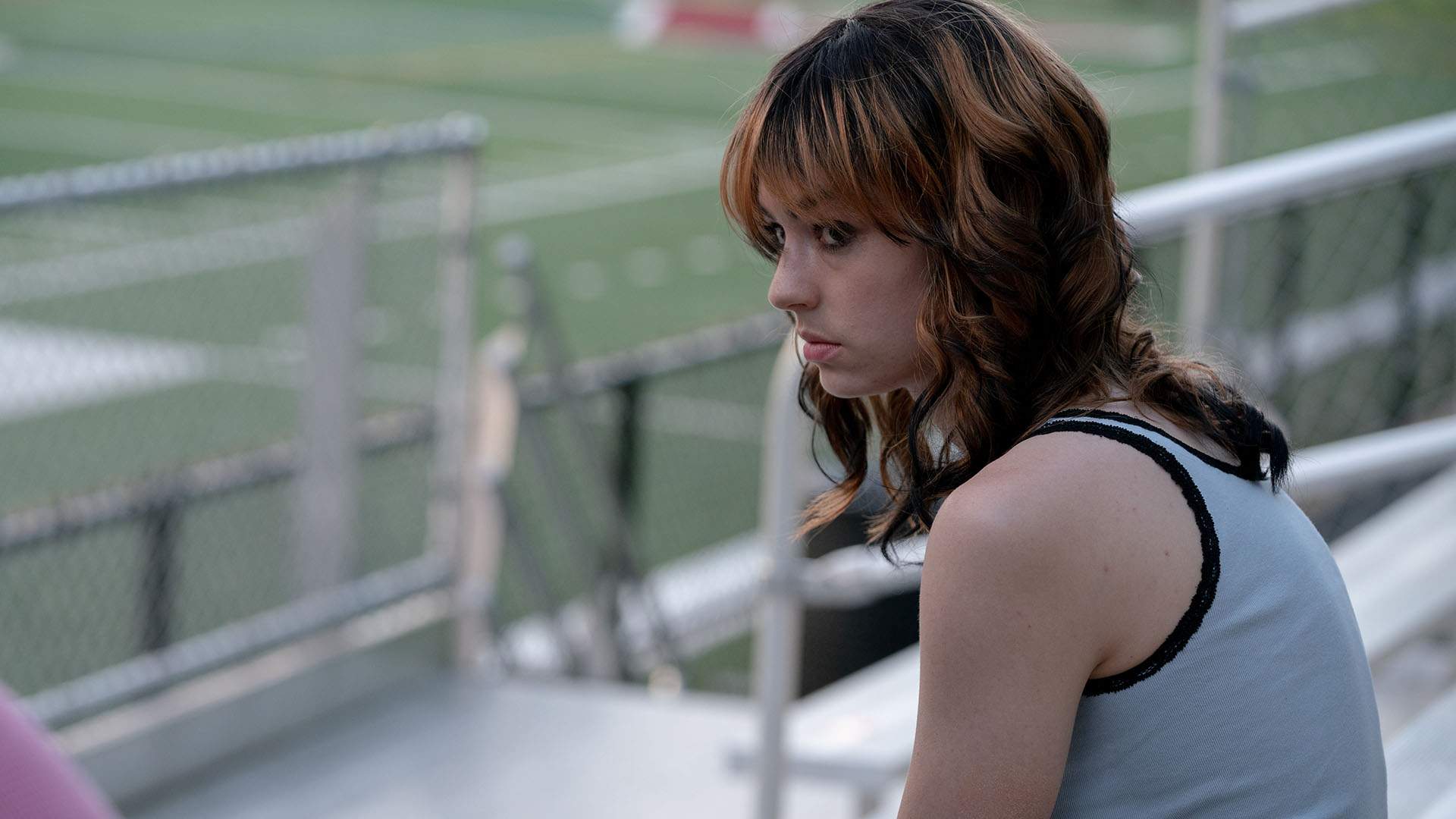
Brigette: "I watched up to season five of Buffy before we started [I Saw the TV Glow], and I just totally fell in love with it. I miss it when I'm not watching it now.
I fell in love with the community, and the idea that magic was real — that there was no question.
I feel like I watched it kind of as Maddy, but I'll always love it as Brigette with the respect of it isn't mine completely, because I didn't watch it when I was young, but I really love it."

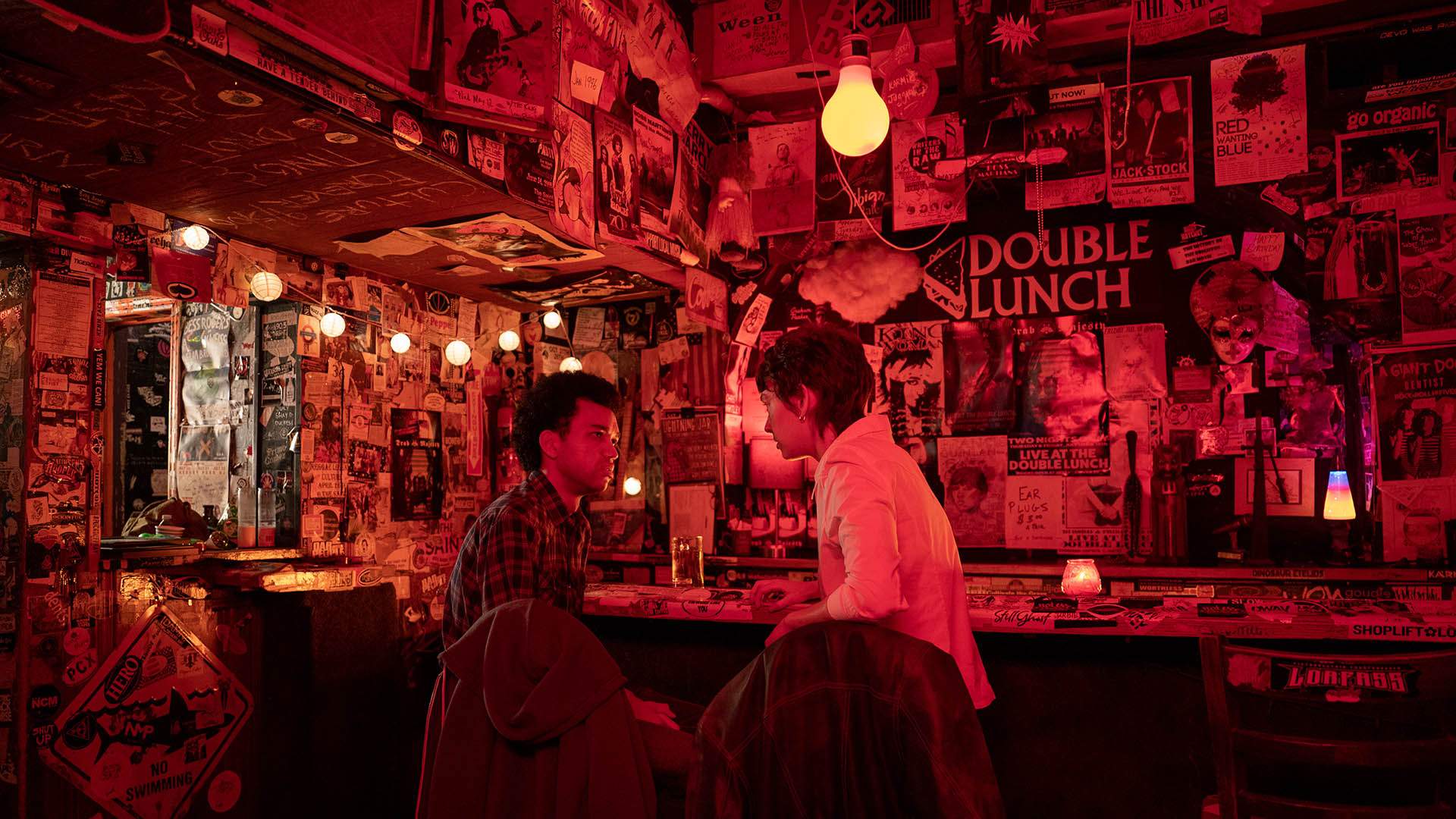
On How Schoenbrun Obsessing Over Buffy — and Also Admiring Twin Peaks — Inspired I Saw the TV Glow
Jane: "I think the experience that the film is trying to talk about — and it's doing this not only in a plot about 90s television, but through the aesthetics and tropes of 90s genre television — is a youth spent in front of the screen.
I was a young queer kid growing up in the American suburbs, and the main thing that got me through that, or the main source of romance and mystery and joy in my life in this place where I think I not only couldn't be myself but I wasn't really being given any information to help me understand myself, the main place that I went looking for myself was in the screen.
This is ultimately why I think like a show like Buffy or Twin Peaks became an obsession, because it was somewhere where I could catch a flicker of something more mysterious, something more magical. And I do think in many ways this was a queer experience.
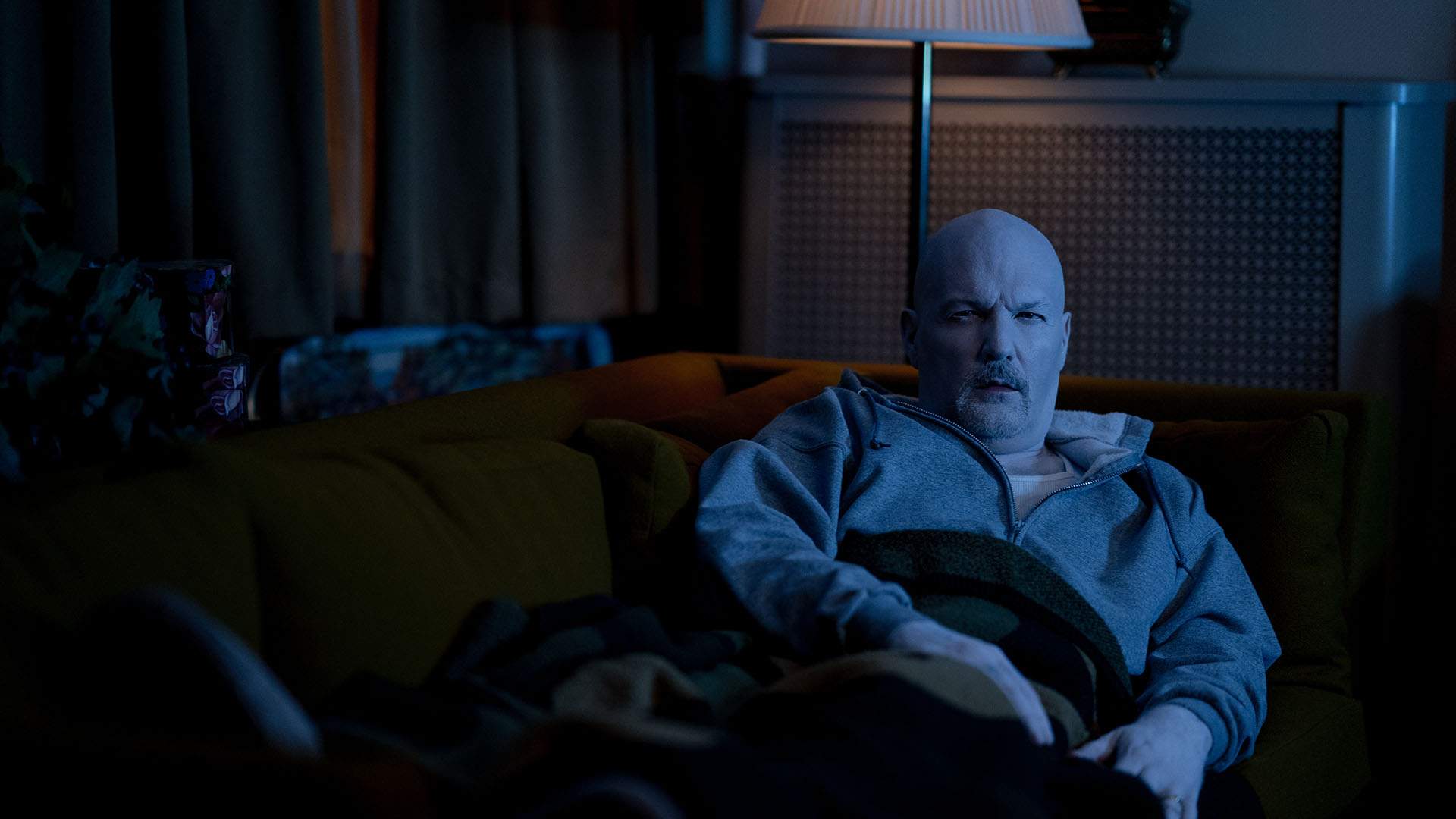
The movie, I think, talks about this very specific kind of parasocial relationship with fiction about fandom, about obsession, about searching for truth in fiction before you're ready to look inside yourself. And it's doing this using these genre cues that I learned from rewatching my Buffy tapes obsessively.
It's a movie about people who love a show like that, but it's also very much a movie that's set in the heightened world of a Buffy or a Twin Peaks or an X-Files."

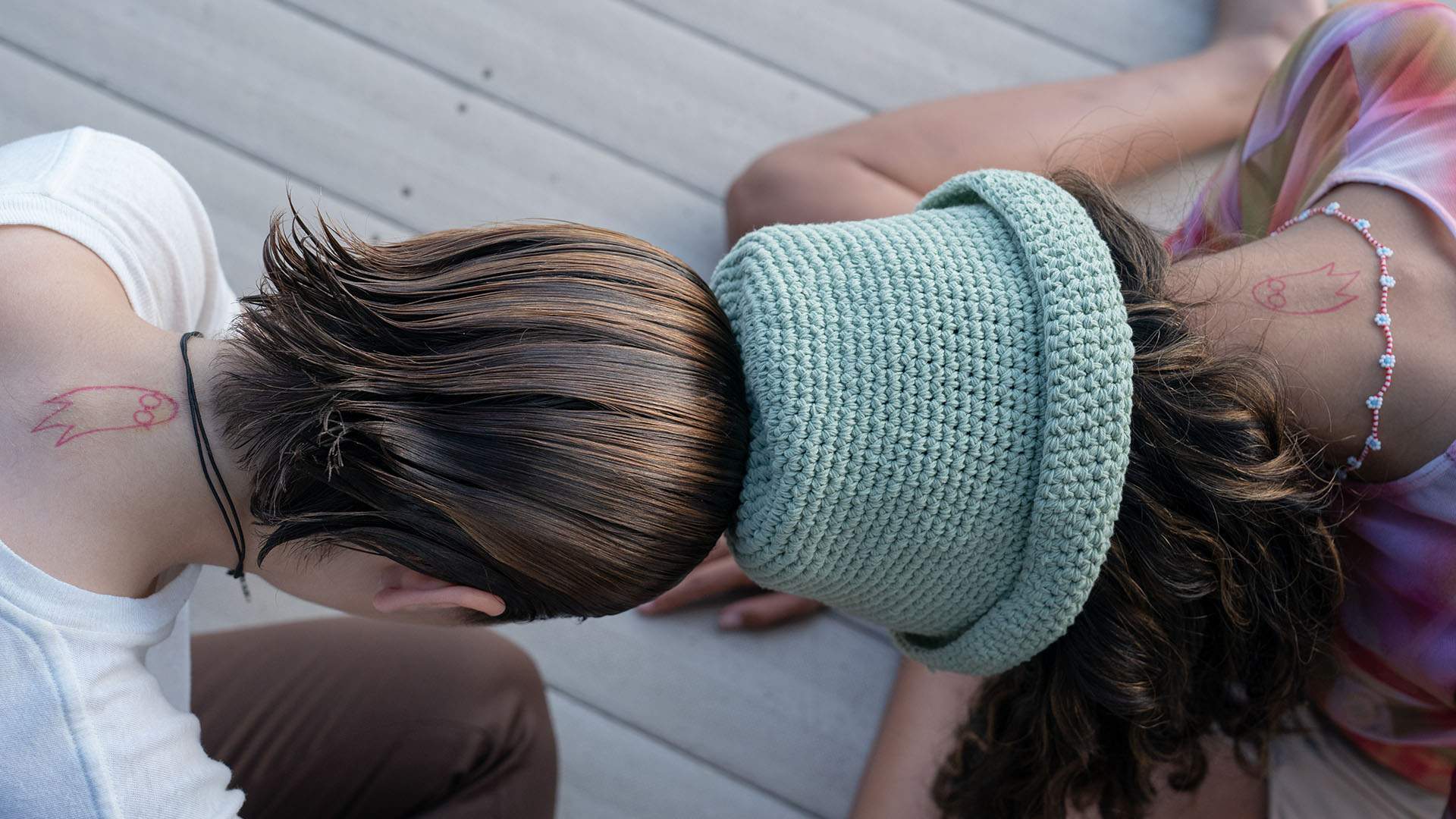
On Lundy-Paine's Equivalent of Buffy or The Pink Opaque
Brigette: "I think the first show that I really loved the way that Maddy and Owen loved The Pink Opaque was The OC. I watched it after it had been released, so I would record reruns from the soap channel.
But I was really obsessed with the characters, and I felt like they were my friends — and it was the most devastating thing I've experienced when Marissa died in season three."

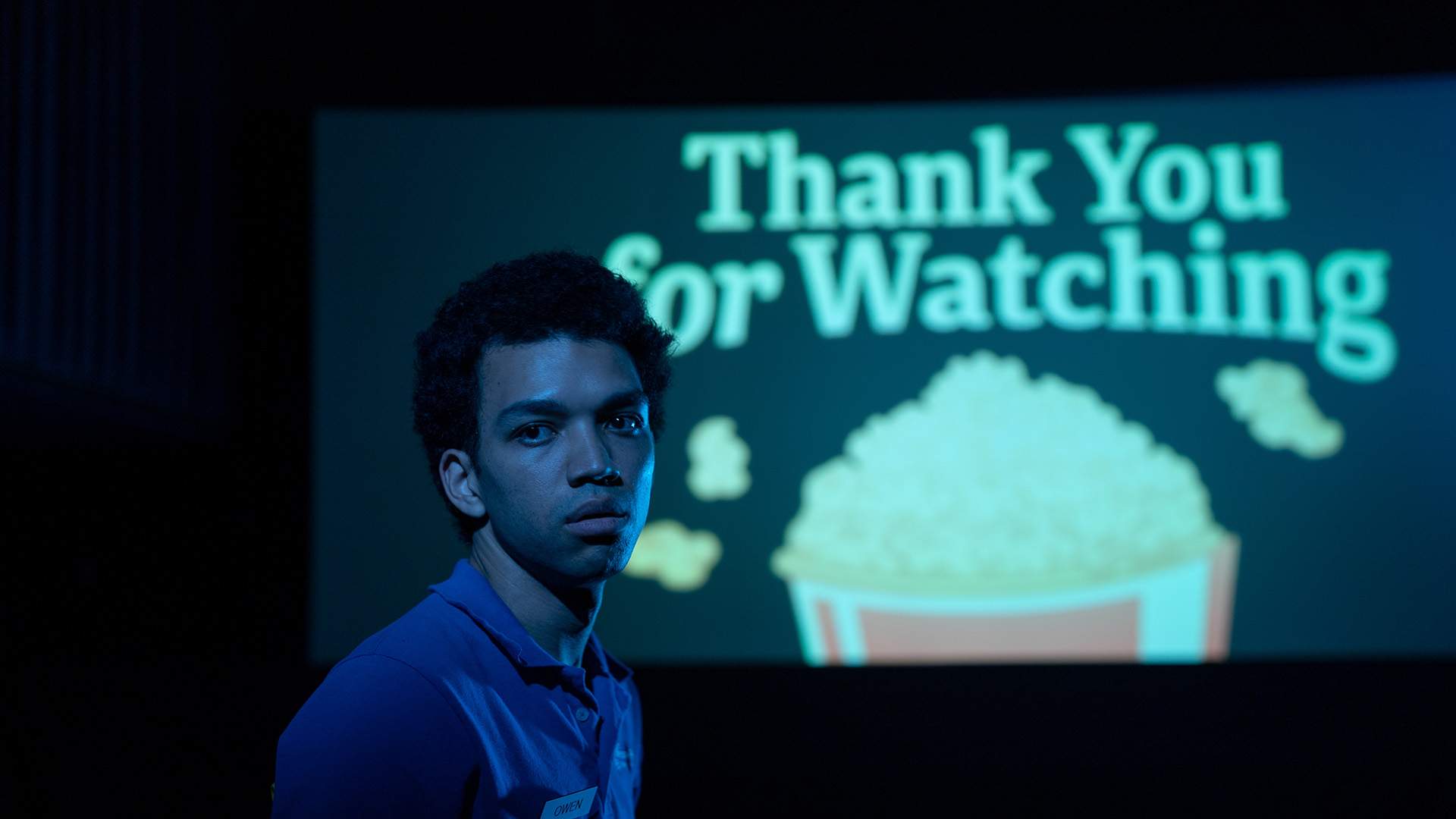
On Making Films About Mediating Our Lives, and Coping with Alienation and Dysphoria, Through Fandom and Pop-Culture Fixations
Jane: "I remember feeling like I've always been an artist, and I've always told myself stories and written screenplays or fan fiction, or anything that I could to be creative. It's a need that I have. But I had so much shame for the longest time about what kind of art I could make that would be authentic and not just a rip off of the things that I love, that would speak from a perspective in a place that that was deeply personal, and that could only come from who I was and where I came from. And a lot of that shame was repression.
But there was this moment that was sort of in tandem with my coming out and my artistic awakening, where I kind of realised this cheat — which was they say 'write what you know', but what I know is watching. What I know is staring at a screen. And I think I'm enough of a self-reflective person to understand that that experience isn't all good or all bad, but that it is rife with mystery and ambiance and loneliness, and connection and love and sadness.
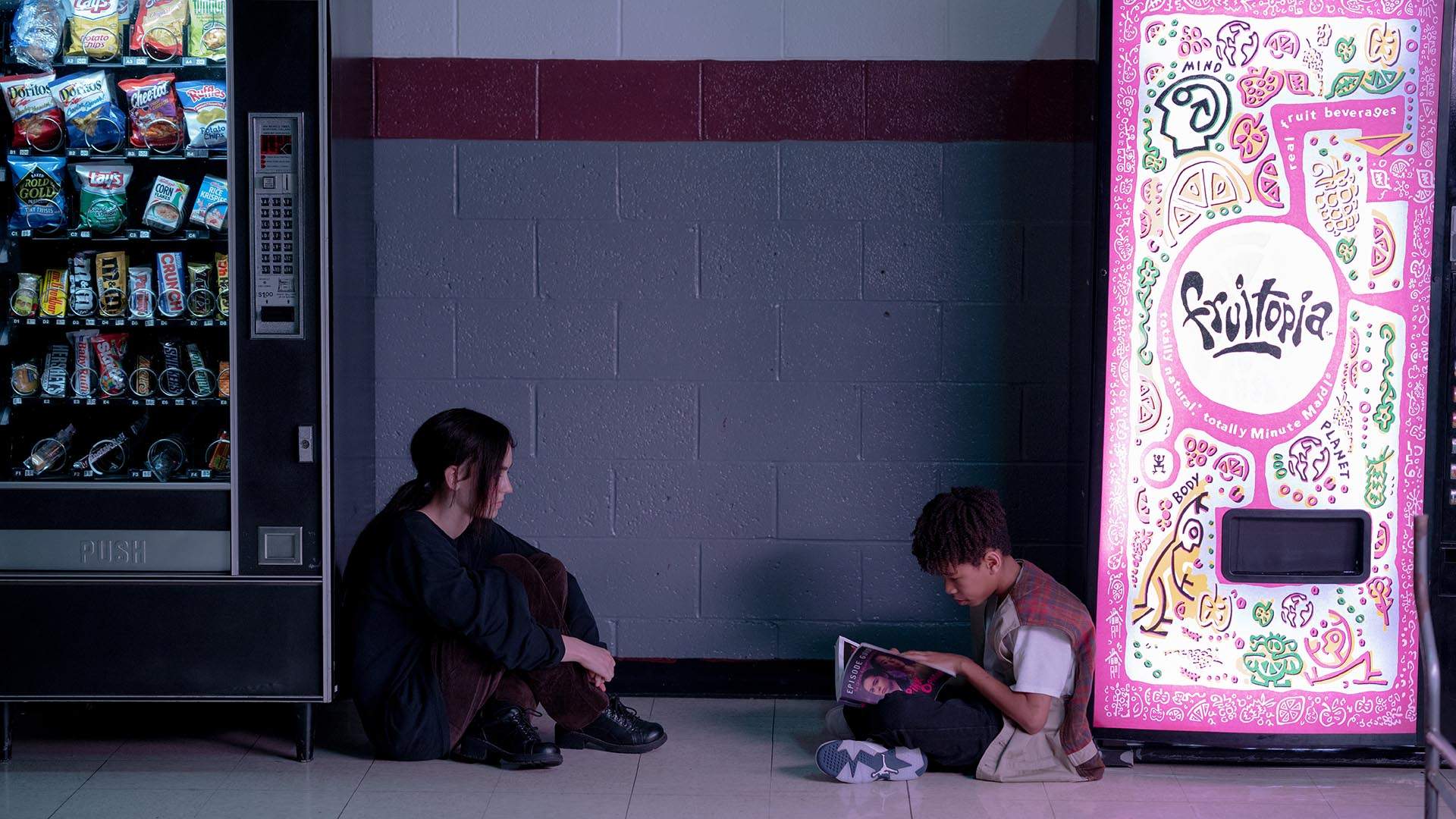
And it can feel scary and alienating. It has political resonance, and it has personal resonance — and it's sort of the thing that we all do that we don't talk about in our art. It mediates our lives so deeply at this point, that in exploring that and not just exploring that from a political perspective but from my own life staring at a screen, and the way that it intertwined with who I was and what I was hiding from in myself, this just became, like I said, a cheat code of sorts to finally unlock my personal voice as an artist.
I find the screen as a symbol just very compelling, both thematically and aesthetically, and it's something that I can return to over and over again without repeating myself so far. I find myself just wanting to dig deeper and deeper into that abyss."

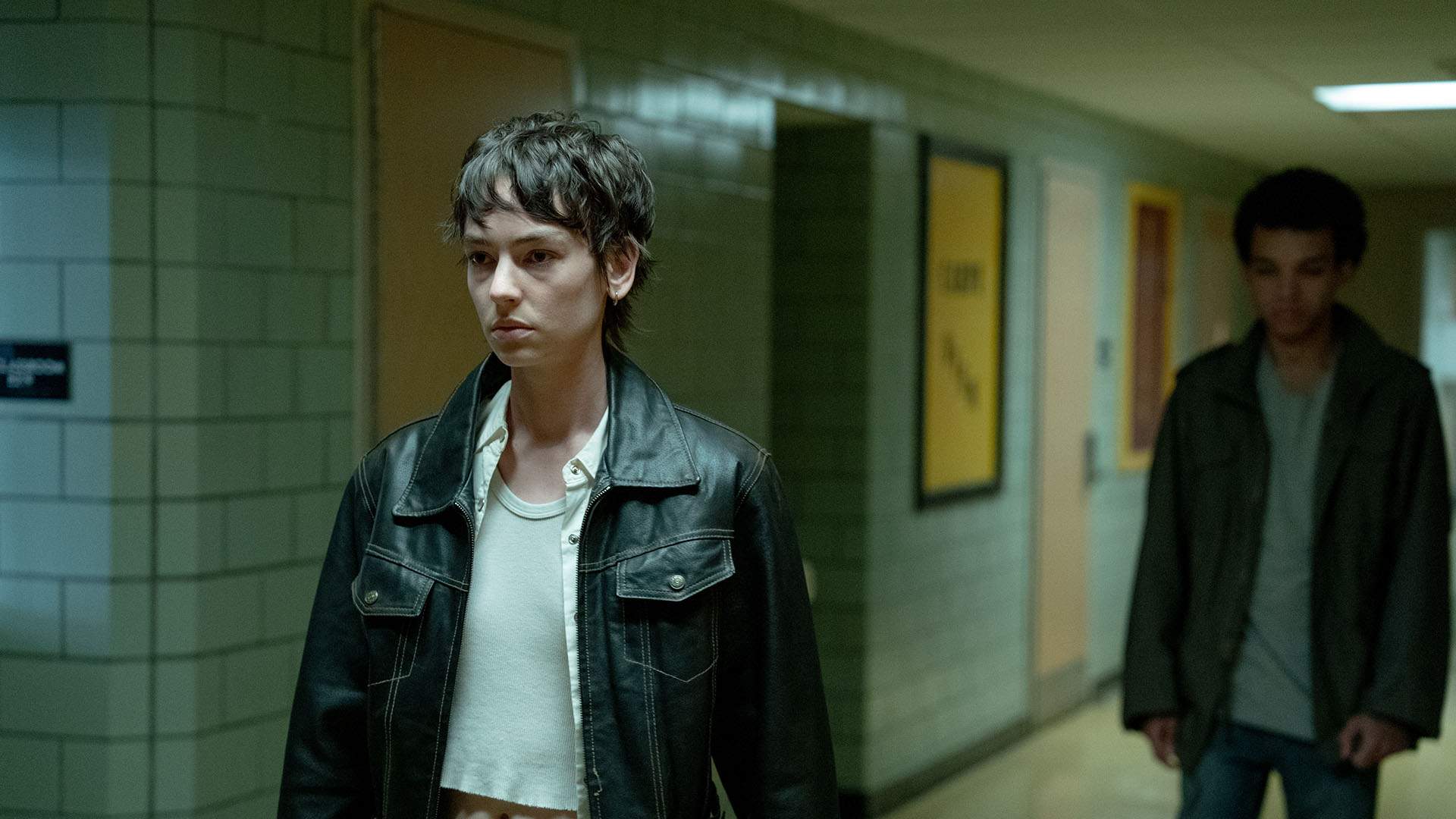
On Starring in a Movie That Is So Personal and Specific to Its Filmmaker
Brigette: "One of the things about Jane that is so exciting is that they're able to communicate these really, really deep experiences and personal feelings in a way that other people feel a part of. I think that was one of the reasons the film was able to get made, was that in meeting after meeting they told their story, and they talked about what it meant for an egg to crack, which is the term of a trans person realising that they're trans.
But also for myself, I had been experiencing the same things or very similar things to Jane, and that was one of the things we connected on when we first spoke — and I think one of the reasons that we trusted each other to make this movie together and to be fully vulnerable for it."

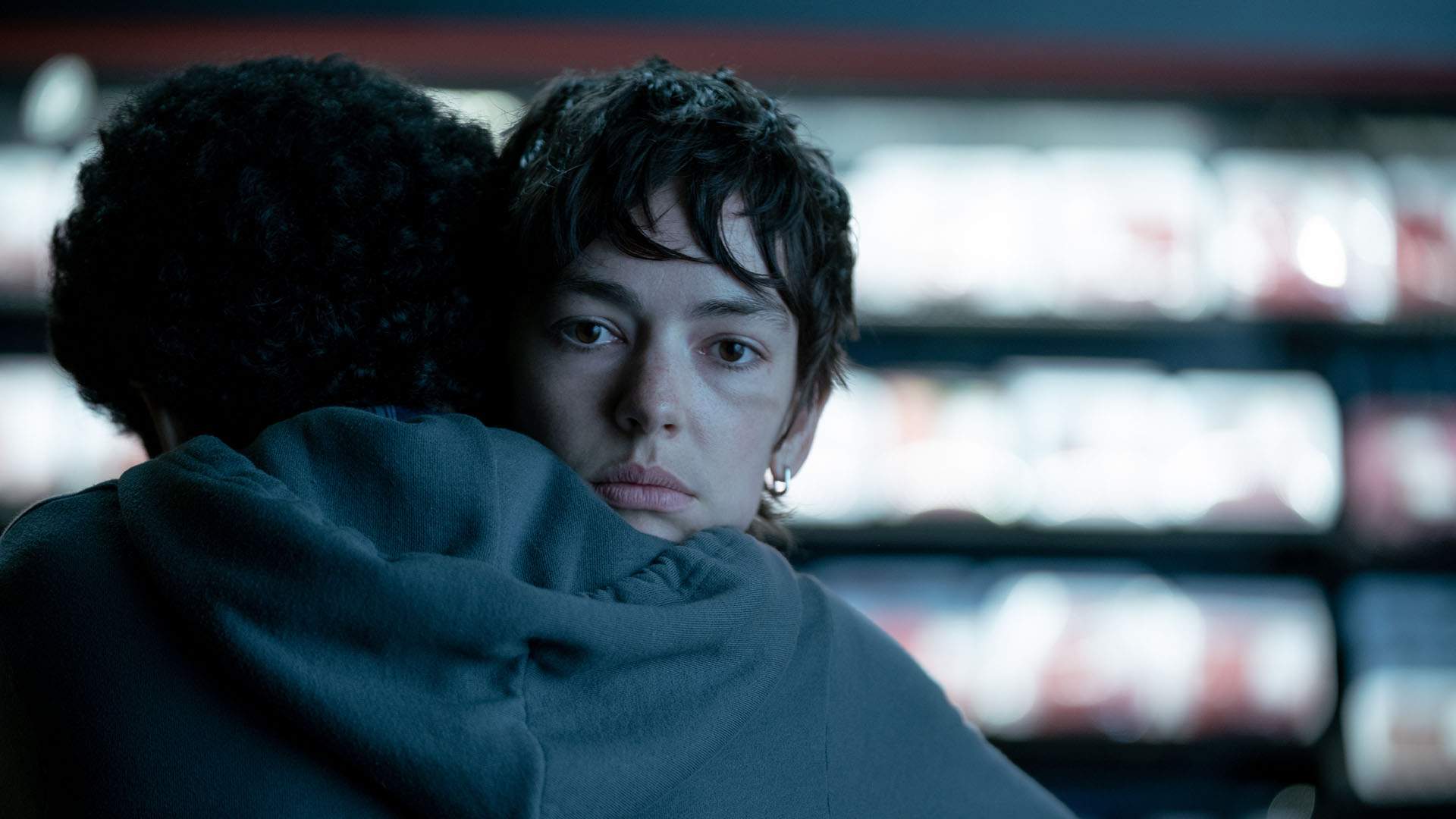
On How Lundy-Paine Came to Be Involved in I Saw the TV Glow
Brigette: "My good friend for a long time, Sam Intill, they sent me the script because they'd met Jane after seeing Jane's first film at Sundance, and they'd come on to produce this second one in its very, very early stages. And Sam connected Jane and I, and Jane and I just got along really, really well right away.
We have a very similar sense of humour and experience, our perspectives of what making movies and what Hollywood meant to us — and the rules that we both wanted to break, and the experiences that we both wanted to help convey to the audience. So that was, I think, maybe two years before production. And then it was pretty locked in for Jane and I that we wanted to work together, and it was just a long process of Jane convincing A24 that that I would play the part.
I had done a TV show, but I'm not a huge name and I think that was tricky for A24 to believe. But Jane was like 'no, it it has to be us. It has to be me and Brige'. And I was very grateful for that. And I had the script for a long time because of it, so I was able to like get really deep and comfortable with the words."

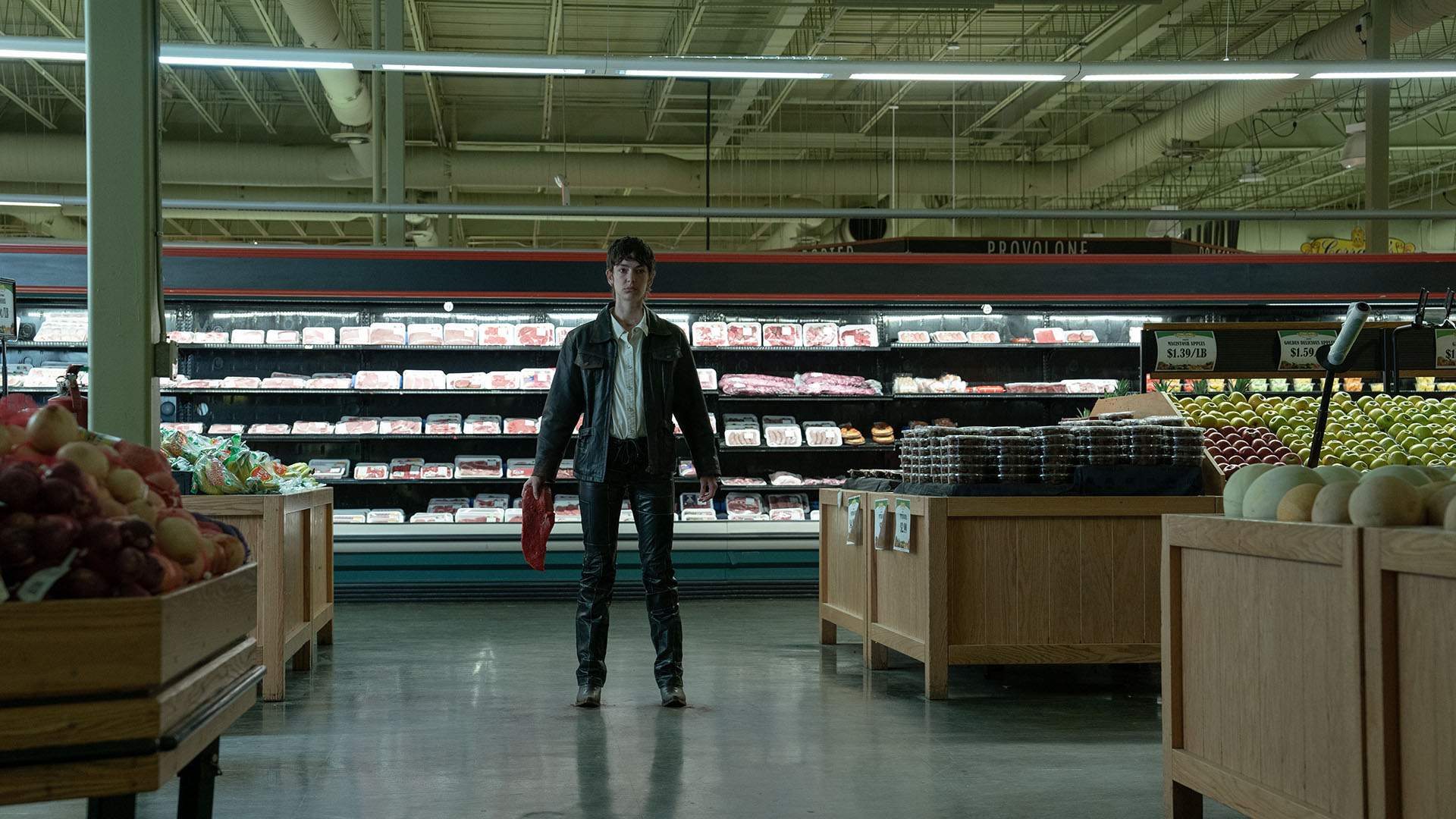
On Lundy-Paine's First Reaction to the Script, What Resonated the Most and What They Saw That They Could Bring to the Film
Brigette: "I think I was just so moved by how real it felt — and how it almost felt like mythology. The emotions of it were coming from such a raw place. And I really liked the way that Jane plays with the sort of shallow, cliched teen dialogue and then moves into a realm of almost subconscious communication to explore the actual meanings of what they're talking about.
I think I felt the colours of the film really strongly. I felt this blue and pink neon electric sensation, and I also just knew that it was a character that I really wanted to have in my body, and I was really anxious to get to know her.
I think I knew that arc very well. If I was different than Maddy myself — but I know, and I really wanted to free myself in the same ways that she did. So I was able to pull from my own angst and fear and love, and obsession with the stories and the worlds that that Maddy finds safety in."

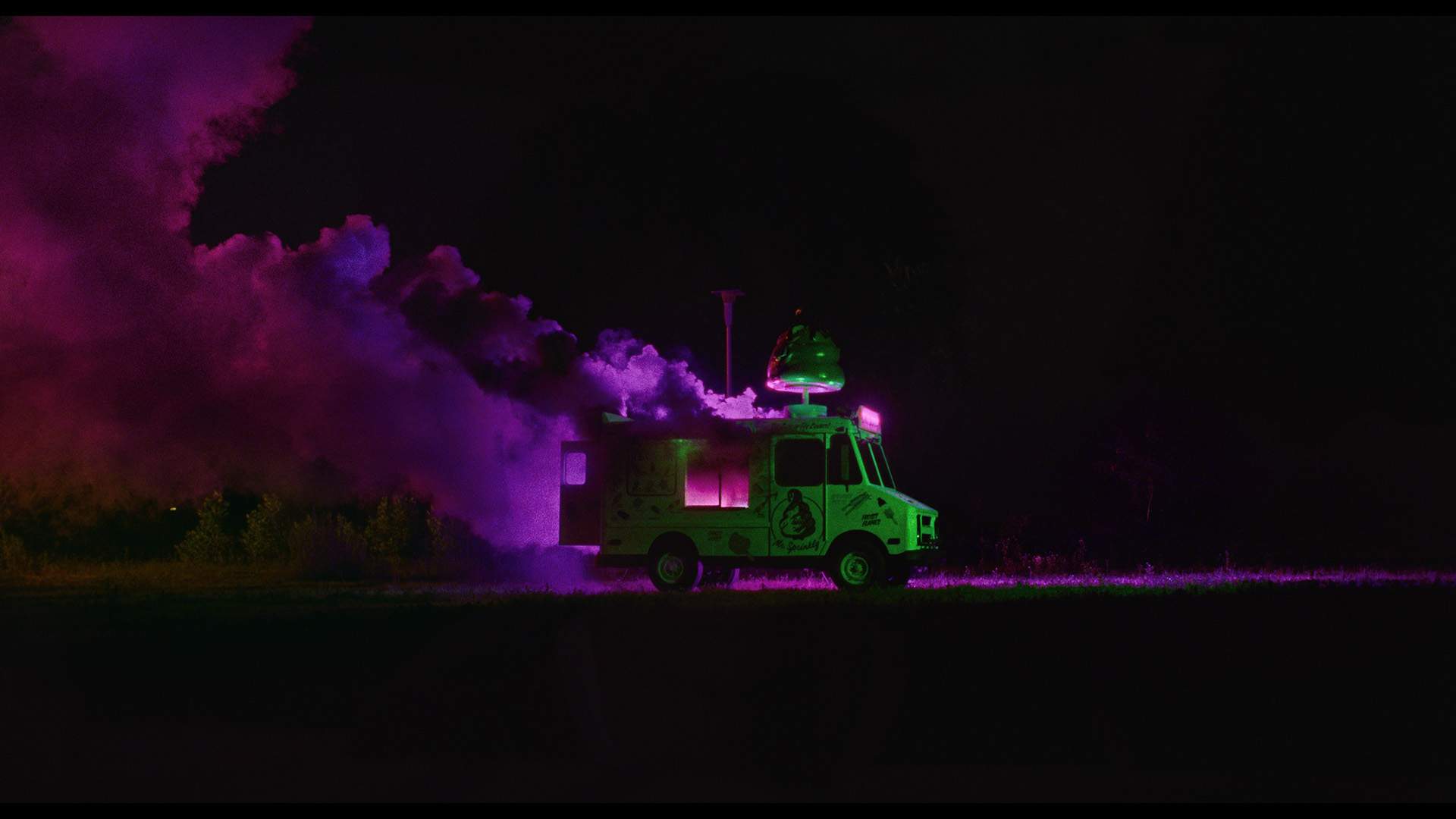
On Schoenbrun's Dreamy, Hazy, Like-You're-in-the-Characters'-Heads Aesthetic
Jane: "Film as a dream was something that I was really interested in from the earliest stages of thinking about a language as an artist, like the idea of the experience of sitting in a dark room and seeing this thing — the only thing you can see. I had and still have these recurring dreams where I'll be watching something and then all of a sudden I will be inside of it.
There were just these repetitions of interest in the process of travelling from watching something to being synonymous with the screen. There's a shot in We're All Going to the World's Fair where we slowly zoom in on a screen until the screen is no longer a screen, and it's our screen. This feels very trance-like to me. This feels like the process of falling asleep or dreaming. It feels very oneiric, and it's just fascinating to me because I think film is a medium so interested in time and space.
Another big influence is the experimental film Wavelength, where we spend the entire movie just slowly moving across the room towards a painting. I find it like such a simple reminder of the power of the medium and perspective in the way that the third eye of the screen can help us understand space in a way that our own eyes can't.
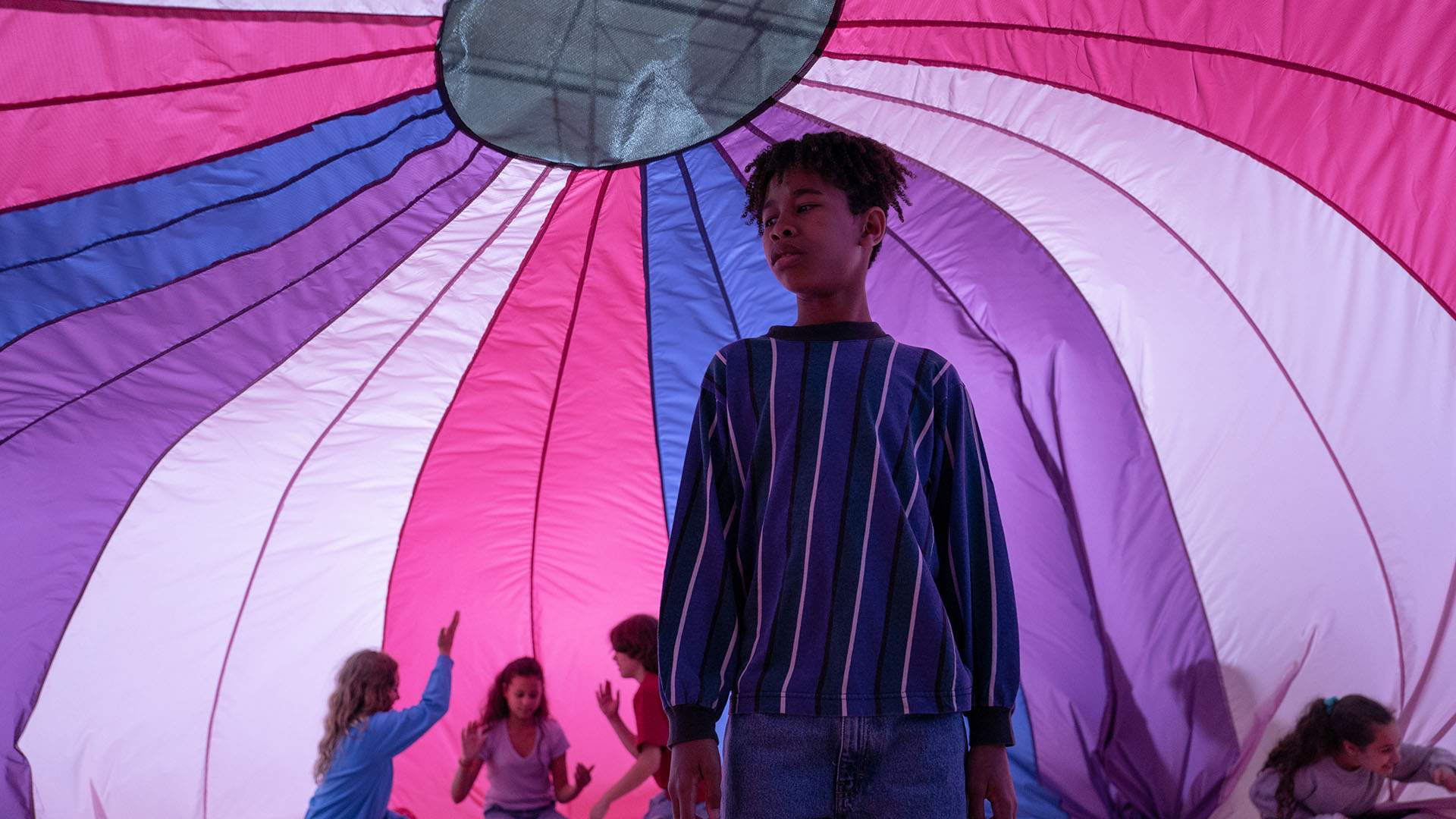
I just like it. There's a deepness and a mystery to it that I find myself continuing to chip away at. I could speculate about why I'm drawn to it. I read a really great book of queer trans film theory called Shimmering Images — Eliza Steinbock, I believe. I read this after I had made We're All Going to the World's Fair and it was an entire book of theory written about trans people's aesthetic connection to the shimmer, to liminality, to a space that is very transitory in its essence, and that we find some comfort in that space of transitory self because we relate to it.
But I think there are so many resonances and so many reasons why I'm fascinated by haze, and by the screen and liminality and lo-fi aesthetics."
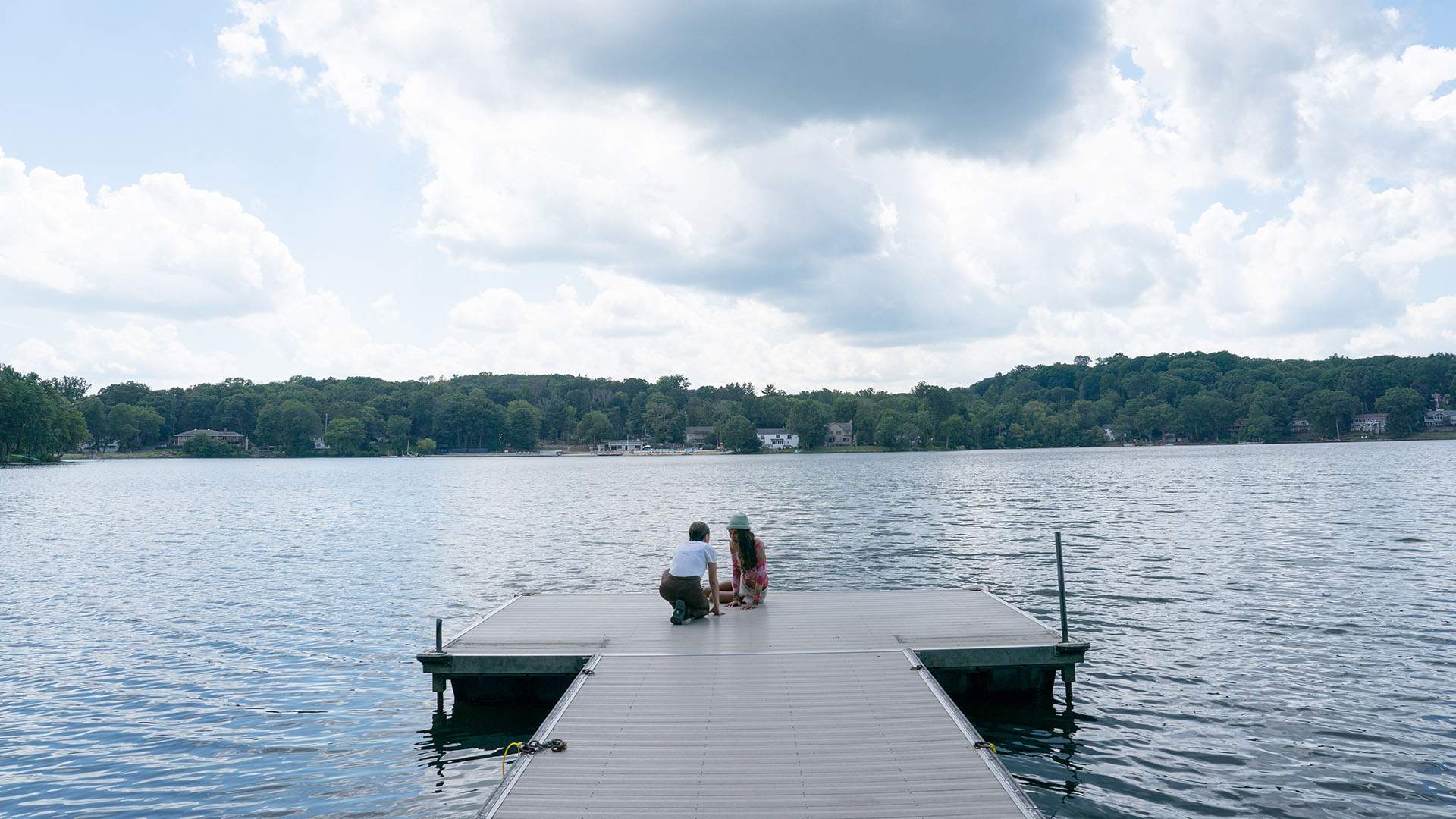
Brigette: "I had so much fun with it because it's rare to work with a director who has a vision of such specific pacing and tone. And so we would do these scenes with, as I mentioned, sometimes the dialogue almost feels like canned or cliched, but because of Jane's style and the way that they're playing with that type of dialogue, it's about the pace and the rhythm.
So we would have rehearsed a lot, but even when we got to set, we would do the scenes too fast. And so Jane had to continuously slow us down and remind us that it was almost as if we were existing in separate universes from each other, Owen and I.
And so Jane would say 'this time, do it and don't even expect him to respond'. And I think that brings out some of that eerie, dreamlike quality."

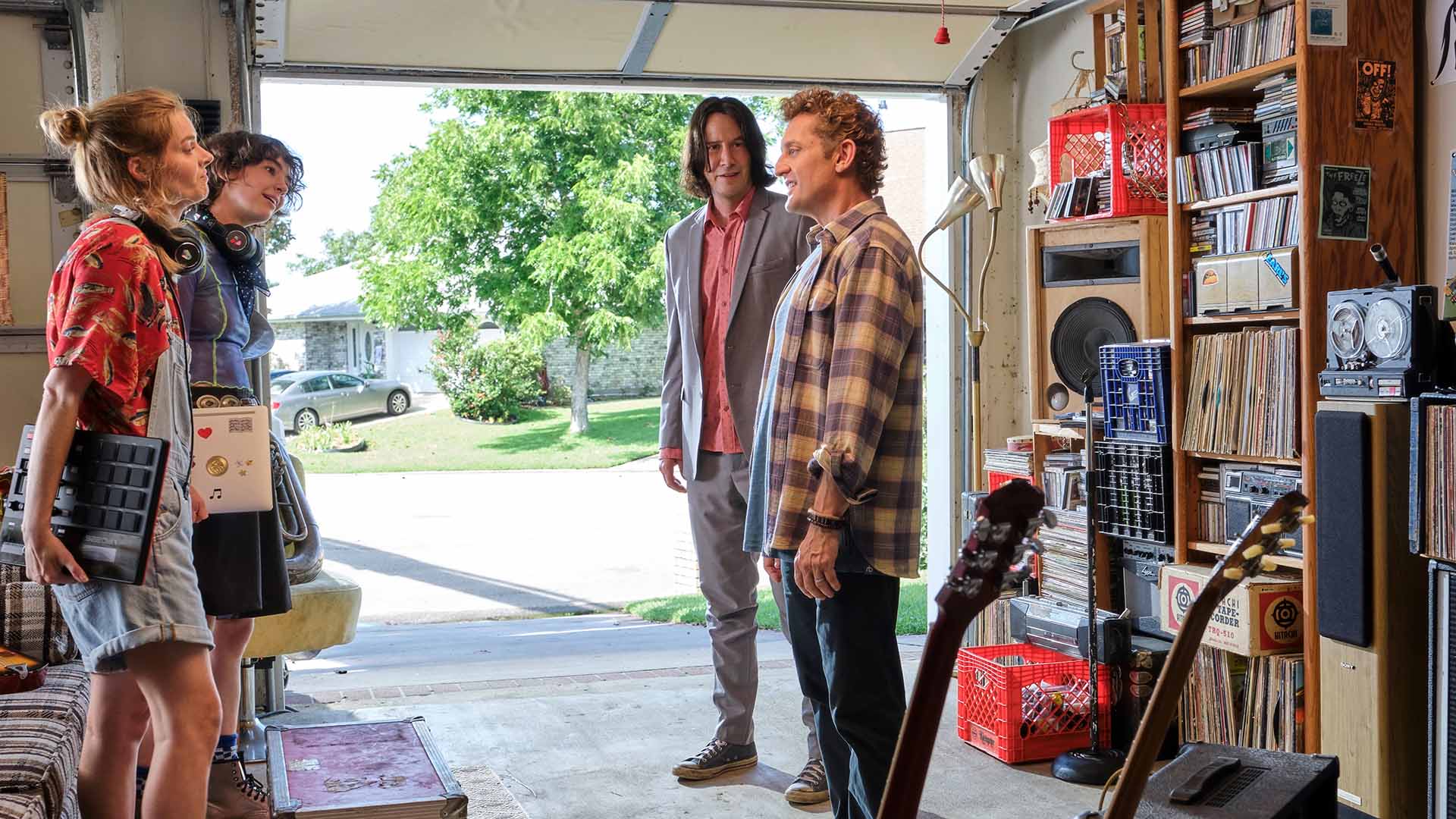
On Lundy-Paine's 90s Nostalgia Bent with Bill & Ted and Now I Saw the TV Glow
Brigette: "I think it's something that interests me because it's something that activates a real personal and vital process for the directors or for the people who are making these films.
I was born in 94, so I didn't experience too much of the 90s, but I obviously understand what it feels like to be nostalgic for, say, 2010. And so I think working on projects that are set in the 90s, it means a lot because it's the childhood, because it's a real place for the people creating these worlds.
And also it just feels iconic. I remember I watched like Fight Club and Donnie Darko while we were filming, just randomly, and both times I was like 'I want to make a movie set in the 90s'. And realised 'ohh we are making a movie set in the 90s right now'."

I Saw the TV Glow is screening in select Australian cinemas now, after opening on Thursday, August 29, 2024.
Images: A24.
